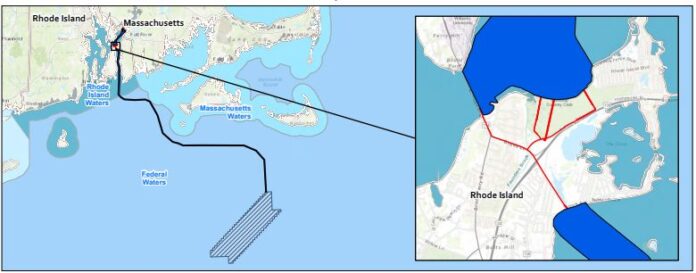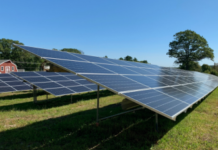
PROVIDENCE – Financial concerns about a Massachusetts offshore wind farm are creating ripple effects in Rhode Island, where regulators are questioning if they should press pause on their own review.
The R.I. Energy Facility Siting Board in an Oct. 10 order asked the developers of the Mayflower Wind project to prove why the board should continue to consider the project’s cable burial plan when the company has admitted to financial problems that could jeopardize the project. The wind farm slated for federal waters between Martha’s Vineyard and Nantucket is expected to bring a massive 2,400 megawatts of wind power to Massachusetts through connections in Somerset and Falmouth. To reach the transmission point in Somerset’s Brayton Point, the developers want to running high-voltage power lines from the wind farm up the Sakonnet River, through Portsmouth and out Mount Hope Bay.
Rhode Island regulators must approve this cable burial component of the project, and has been working through a series of procedural hearings and internal review since Mayflower Wind Energy LLC filed the application in May.
While the Mayflower Wind developers have given the Rhode Island board no indication that its plans may be at risk, according to the order, recent filings to the Massachusetts Department of Public Utilities tell a different story.
Last month, Mayflower Wind joined with another Massachusetts offshore wind developer in asking the DPU for a one-month suspension on its contract review due to financial concerns, according to news reports. After the DPU denied the request, Mayflower Wind walked back on the need for a suspension, but indicated there were still unresolved financing problems.
“Mayflower will seek to resolve with the Petitioners and the Commonwealth the issues discussed above, beginning by providing petitioners and the department with detailed third-party analysis demonstrating challenges to financeability, with the goal of finding solutions that provide value to ratepayers,” the company said in a response to the DPU.
Which has Rhode Island regulators concerned.
Not only did Mayflower Wind fail to share the updates on its financial problems with the R.I. energy board, as required, but the problems themselves might warrant a pause on the board’s review, according to the order.
“One cannot logically claim that the transmission facilities that are jurisdictional to the EFSB are needed if it is apparent that the offshore wind generation project to which the transmission facilities would be interconnected will not be economic or financially viable before the licensing proceedings examining need even commence,” Ronald Gerwatowski, chairman of the Energy Facility Siting Board, said in the order.
He also stated, “It is not reasonable or fair to those governmental agencies, including the EFSB, to spend time and resources evaluating an application for a project which may only be hypothetical in nature due to an admission by the applicant that the proposed project is not going to be financially viable.”
Developers will now have to make their case to Rhode Island regulators through a “show cause hearing” on why the review of its pending application should continue. The hearing has not been scheduled, although the developer on Tuesday asked for an extension on the original, 10-day deadline.
Mayflower Wind Energy, which is a joint venture between Shell New Energies US LLC and Ocean Winds North America, declined to comment.
Nancy Lavin is a PBN staff writer. You may reach her at Lavin@PBN.com.












